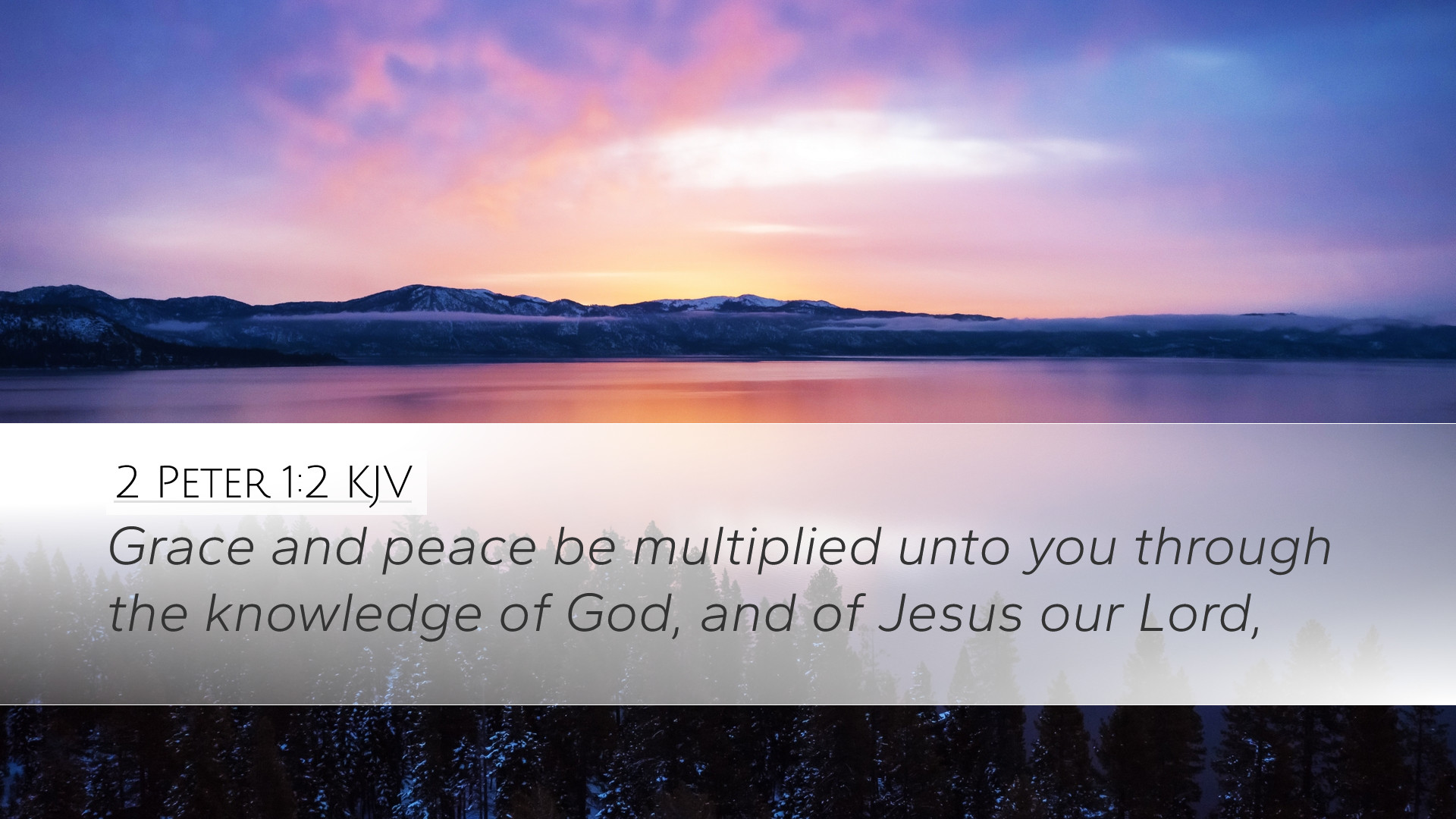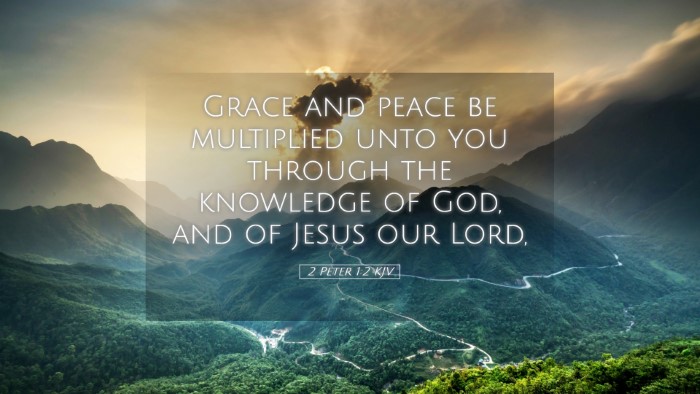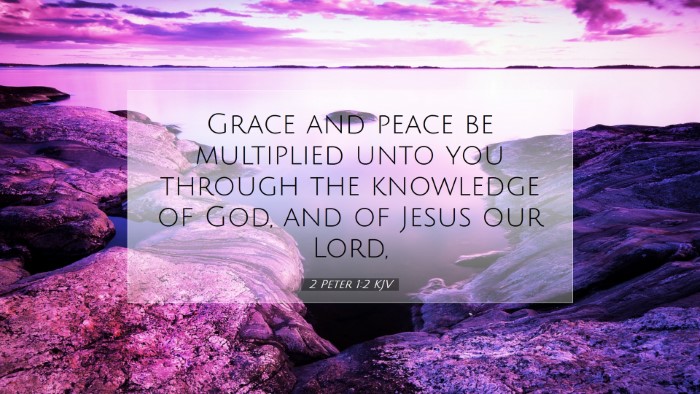Old Testament
Genesis Exodus Leviticus Numbers Deuteronomy Joshua Judges Ruth 1 Samuel 2 Samuel 1 Kings 2 Kings 1 Chronicles 2 Chronicles Ezra Nehemiah Esther Job Psalms Proverbs Ecclesiastes Song of Solomon Isaiah Jeremiah Lamentations Ezekiel Daniel Hosea Joel Amos Obadiah Jonah Micah Nahum Habakkuk Zephaniah Haggai Zechariah Malachi2 Peter 1:2
2 Peter 1:2 KJV
Grace and peace be multiplied unto you through the knowledge of God, and of Jesus our Lord,
2 Peter 1:2 Bible Commentary
Commentary on 2 Peter 1:2
Verse: "Grace and peace be multiplied unto you through the knowledge of God, and of Jesus our Lord."
Introduction
This verse encapsulates the foundational themes of the Christian faith, emphasizing the pivotal relationship between divine grace, peace, and the knowledge of God. This commentary will explore the insights provided by esteemed public domain commentators, including Matthew Henry, Albert Barnes, and Adam Clarke, to canvas the richness of this scripture.
Grace: A Divine Gift
Matthew Henry elucidates that grace here signifies not merely unmerited favor but the comprehensive work of the Holy Spirit in the lives of believers. It is a multi-faceted blessing that encompasses justification, sanctification, and the eventual glorification of the faithful. He stresses that this grace is not a one-time event but a continual infusion that the believer receives.
Albert Barnes adds to this by suggesting that the multiplication of grace indicates an abundance that exceeds mere survival; it empowers Christians to live above their natural abilities and limitations. Barnes notes that the Greek term used here for 'multiplied' conveys a sense of superabundance, highlighting God's willingness to pour out His grace upon the believer.
Adam Clarke reinforces this by indicating that grace results in spiritual vitality. He argues that without the multitude of God’s grace, spiritual life cannot thrive. Clarke suggests that this grace must be actively embraced by the believer, leading to a fruitful and active Christian walk.
Peace: The Fruit of Grace
Matthew Henry emphasizes that peace is a byproduct of grace, acting as a vital element in the believer's relationship with God and fellow humans. He states that true peace arises only when one is in a right standing with God through grace, allowing believers to experience serenity even amid turmoil.
Albert Barnes remarks that peace also represents internal tranquility that stems from a conscious awareness of God's grace. This peace is reflective of a restored relationship with God, which eradicates the anxieties of life. The multiplicity of peace indicates an exponential capacity to overcome life's troubles.
Adam Clarke notes the importance of peace being multiplied as a blessing that enhances the believer's experience of God's presence. He emphasizes that peace should not only be understood as absence of conflict but as a profound and positive state of well-being that comes from an intimate relationship with Christ.
The Knowledge of God
The verse articulates that grace and peace are multiplied through the knowledge of God. Matthew Henry highlights that this knowledge is not merely intellectual but is intimately relational. It involves a deep understanding of God's character and attributes revealed through scripture and experience.
Albert Barnes expounds that knowing God is crucial for spiritual growth. This knowledge leads to a deeper understanding of God's grace and peace, suggesting that ignorance of divine truths can hinder one's spiritual progress. Barnes encourages believers to pursue this knowledge fervently, as it serves as the foundation for a thriving Christian life.
Adam Clarke contributes by noting that this knowledge also involves the cognizance of Christ as Lord. He posits that understanding who Christ is—His life, death, resurrection, glory, and future return—is integral to grasping the fullness of grace and peace. Clarke connects this knowledge with the transformative power it holds for believers, leading to a life that mirrors Christ’s character.
The Interrelationship of Grace, Peace, and Knowledge
The interconnectedness represented in this verse is profound. Matthew Henry notes that grace lays the groundwork for peace, while knowledge illuminates one’s understanding of both. The more believers comprehend God’s grace and peace, the more they live out those realities.
Albert Barnes further notes that this triad forms a cycle: as grace is experienced, peace follows, and both drive the believer to seek a deeper understanding of God. He states that this knowledge, whatever the challenges faced, undergirds the believer’s perseverance.
Adam Clarke reiterates this cycle, indicating that as believers grow in knowledge, they experience enriched grace and peace. Clarke reminds readers that this journey is ongoing, fostering a life that is ever-expanding in spiritual depth and fruitfulness.
Application for Today’s Believers
This verse serves as a powerful reminder for modern believers. They are encouraged to continually seek God through His Word, thereby discovering more about His character and ways. Matthew Henry would urge congregations to delve deeply into scripture so that they may continually experience the flow of God's grace.
- Daily Reading: Regular engagement with Biblical texts will deepen understanding and enhance knowledge.
- Prayer and Meditation: These practices foster intimacy with God, inviting His grace into daily routines.
- Community Fellowship: Engaging with a community of believers enriches one's understanding and offers collective wisdom.
Conclusion
2 Peter 1:2 is a profound declaration of the Christian experience. The coalescence of grace, peace, and knowledge presents a holistic framework for spiritual life. Matthew Henry, Albert Barnes, and Adam Clarke collectively illuminate the richness of this verse, revealing its implications for personal transformation and communal faith. As believers immerse themselves in the knowledge of God, they find grace and peace multiplying in their lives, equipping them to face challenges with heavenly confidence and strength.


